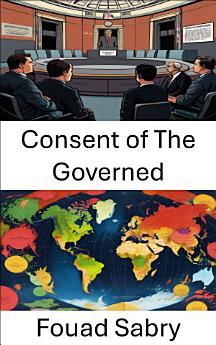Consent of The Governed: Exploring Democratic Legitimacy and Civic Engagement in Modern Governance
About this ebook
1-Consent of the Governed-The foundation of government legitimacy through people's consent.
2-John Locke-Locke’s theories on government and natural rights that shaped democratic thought.
3-Political Philosophy-Insights into political philosophy and its impact on democratic principles.
4-Sovereignty-The concept of sovereignty and its relation to consent in governance.
5-Social Contract-How social contract theory defines the relationship between the governed and rulers.
6-U.S. Constitution-The Constitution as a reflection of consent and democratic governance.
7-Declaration of Independence-The Declaration’s role in articulating consent and self-governance principles.
8-Authority-The nature of political authority and its legitimacy through consent.
9-Natural vs. Legal Rights-Differentiating natural and legal rights within democratic theory.
10-Popular Sovereignty-The concept of popular sovereignty and its modern democratic application.
11-Divine Right vs. Democratic Consent-Evolving notions of political legitimacy.
12-Virginia Declaration of Rights-Its influence on American political thought and consent principles.
13-State of Nature-Implications of the state of nature for consensual governments.
14-Political Legitimacy-Dependence on the consent of the governed.
15-Two Treatises of Government-Locke’s impact on political philosophy and democratic theory.
16-Limited Government-Alignment of limited government with the concept of consent.
17-Compact Theory-Emphasis on voluntary agreements among the governed.
18-Right of Revolution-Its implications for political change in response to breaches of consent.
19-Voluntary Taxation-Role of voluntary taxation in democratic governance.
20-Popular Sovereignty in the U.S.-Manifestation in U.S. political practices and institutions.
21-Philosophy of Human Rights-Connection between human rights philosophy and the principle of consent.
This book offers valuable insights into democratic principles and political philosophy, making it a vital addition to any political science library.











